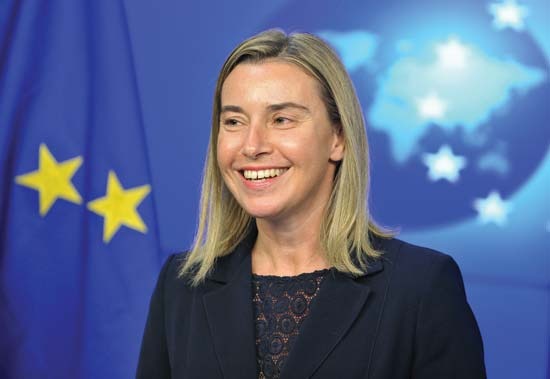Federica Mogherini defended the Iran nuclear deal (JCPOA) in her speech last week at the European Parliament plenary session and claimed that Iran has committed never to develop any nuclear weapons. She echoed Iranian foreign minister Mohammed Javad Zarif who simultaneously wrote in the New York Times that his country’s military capabilities are entirely defensive.
In July 2015 the E3+3 powers (US, Russia, China, Britain, France, Germany) and Iran agreed on a Joint Comprehensive Plan of Action (JCPOA) concerning the dismantling of the Iranian nuclear programme. In the preamble to the agreement Iran reaffirmed that it under no circumstances will ever seek, develop or acquire nuclear weapons.
In return the international community lifted most of the economic sanctions against Iran. The arms embargo will continue to be in place for a number of years.
However, as regards concrete actions, the JCPOA specifies how Iran’s nuclear programme will be reduced and constrained under the next 10 – 15 years in terms of number of centrifuges, stockpile of enriched uranium and advanced nuclear research. As a result Iran’s breakout time for producing a nuclear weapon will increase from two months to one year.
“I meet regularly with Foreign Minister Zarif,” High Representative/Vice-President Federica Mogherini said without addressing Iran’s destabilizing role in the Middle East. “For more than two years now, we have built a very frank relationship with Iran: we are always open about our disagreements, and there are many, and we always try to find the best way to address them.”
“Preserving and implementing the nuclear deal with Iran is an absolute must,” she underlined. “We simply cannot afford more tension in the Middle East and another nuclear proliferation crisis. We cannot afford to undermine the credibility of a multilateral agreement, endorsed by the UN Security Council Resolution, and we cannot afford to dismantle a deal that works and delivers on its promises.”
The JCPOA significantly reduce Iran’s nuclear capacity and will no doubt reduce the risk of Iran producing a nuclear weapon in the short-term. What will happen in the medium- and long term is however uncertain. A crucial factor is the monitoring regime. Mogherini stated that it is the strongest monitoring system ever set up.
But as Mogherini admitted there is not much trust between the parties and Iran cannot be trusted. “It is exactly because it is a country like Iran that you need to have a nuclear deal with Iran. Because you do not want a country like Iran in that region to develop a nuclear weapon.”
Unfortunately the on-the spot controls are not water tight. International monitors will not have access to the civilian and military nuclear sites whenever they want. The Iranian authorities will have up to 24 days to delay a control, under which time they might remove nuclear material. Disagreements on the monitoring will be resolved by a complicated dispute resolving mechanism.
In her eager to defend the nuclear deal Mogherini claimed that “there is no sunset clause in the agreement”, referring to a clause which says that the whole agreement shall cease to have effect after a specific date, unless further action is taken to extend its duration.
“Read all the 104 pages of the agreement - there is no sunset clause to the agreement. The agreement has different provisions - many different provisions - with many different durations. Most of them last for a long, long, long time. Most of them last forever,” Mogherini said.
But considering the fact that some of the key limitations on uranium-enrichment activities phase out between 10 and 15 years after the implementation of the deal, starting from January 2016 – can Mogherini and EU be sure that Iran will not resume enrichment activities?
Asked by The Brussels Times to clarify Mogherini’s statement, an EU spokesperson seemed less determined. “There are some provisions in the agreement that have a temporary duration. There are other provisions that have no temporary limit – they are valid indefinitely. And there are the commitments of Iran as a member of the Non-Proliferation Treaty.”
According to the spokesperson, Iran will also have to apply the IAEA Safeguards Agreement and Additional Protocol forever, which will give the IAEA a mandate to monitor Iranian nuclear activities and allow it to provide assurances about the peaceful nature of the Iranian nuclear programme.
Currently, Iran is implementing the additional protocol on a voluntary basis. Under the nuclear deal, Iran must ratify the additional protocol by October 2023.
EU hopes that the agreement will pave the way for a normalization of relations between Iran and the rest of the world, including Israel. If indeed the agreement is implemented to the letter and the spirit, and Iran during the first 10 – 15 years opens up to the world and embarks on a peaceful policy in the Middle East, the situation by then might be totally different from now.
In the meantime economic relations between EU and Iran are developing. Trade between Iran and Europe increased 94 percent in the first half of 2017, compared to the first half of 2016, according to Mogherini’s figures. Oil exports have reached pre-sanctions level, and billions of outstanding oil debts have been paid back.
M.Apelblat
The Brussels Times

